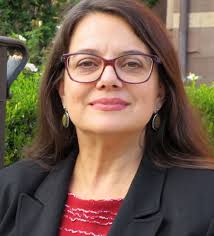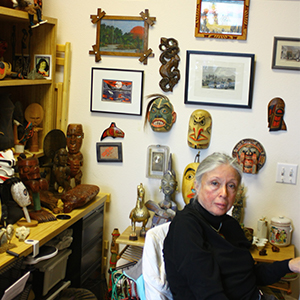
With the permission of Teresa Blankmeyer Burke, and at her request, IJFAB Blog sadly shares Prof. Burke’s obituary for one of feminist bioethics’ great voices, Anita Silvers. This was first published over at the Feminist Philosophers blog. For more on Silvers’ work, see also the American Philosophical Association’s remembrance and her department’s remembrance. In the days since Silvers’ death, this Editor–Alison Reiheld–has seen countless bioethicists whose lives and work add new approaches to our field say that they would never even have pursued bioethics without Silvers’ work and her personal support. Silvers was a an everpresent force in my own life as a young philosopher. Though I doubt she knew me, I certainly knew her, and found her philosophical interventions at talks to be deeply thoughtful and incisive without exception.
Dr. Anita Silvers in her office at San Francisco State University:

We report with sadness the death of Professor Anita Silvers of San Francisco State University on Thursday, March 14, 2019. She was known for her work in aesthetics, bioethics, feminism, philosophy of justice, philosophy of disability, philosophy of law, and social and political philosophy. Dr. Silvers was the author of dozens of articles and author and editor of several books, including Disability, Difference, Discrimination: Perspectives on Justice in Bioethics and Public Policy with David Wasserman and Mary B. Mahowald (Rowman & Littlefield, 1998); Americans with Disabilities: Exploring Implications of the Law for Individuals and Institutions, co-edited with Leslie Francis (Routledge, 2000); and Puzzles About Art co-authored with Margaret Battin, John Fisher, and Ron Moore (St. Martin’s Press, 1989).
In addition to her groundbreaking scholarship, Professor Silvers was a disability rights activist with a storied history of service to the profession. She was longstanding Secretary-Treasurer of the American Philosophical Association (APA) Pacific Division (1982 to 2008), and she chaired the APA Committee on Inclusiveness in the Profession (2010-2013). She was the recipient of numerous awards, including the 2009 APA Quinn Prize for Service to the Profession, the 2013 APA and Phi Beta Kappa Lebowitz Prize for Philosophical Achievement and Contribution, the 2017 California State University (CSU) Wang Family Excellence Award for extraordinary contributions to the CSU system, and the inaugural California Faculty Human Rights Award.
I’ve been at a loss for words since I first learned of Anita’s passing. It was unexpected; she was currently working on several projects with me and also with many others. She was first my advocate, then mentor, then colleague and friend. Feminist Philosophers has a tradition of featuring a passage from the work of the philosopher we memorialize. Anita’s work on disability justice was grounded in her experience as a disabled person and her activism on behalf of people with disabilities. She was a fierce advocate and a brilliant strategist of disability accommodations. I leave you with these words, the conclusion from her essay “Formal Justice”.
Listening to the voices of people with disabilities in their own words quoted throughout this essay, we cannot help but have observed that, foremost, they desire a public sphere that embraces their presence. For them, equality means taking their places as competent contributors to well-ordered cooperative social and cultural transactions. For them, justice must offer, first, the visibility of full participatory citizenship, not a spotlight that targets them as needing more than others do. (Disability, Difference, Discrimination; p. 145)
Information about a memorial service for Professor Silvers will be posted later.

